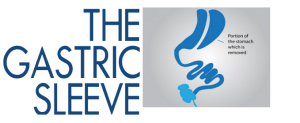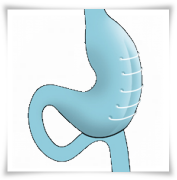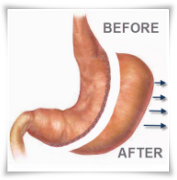Gastric Sleeve Complications
Gastric Sleeve is a form of weight loss surgery which is gaining momentum today to lose weight, however there are still some gastric sleeve complications that you should be aware of. We’ll cover some of the gastric sleeve complications on this page.
Click here for more information about the Gastric Sleeve.
About The Gastric Sleeve Procedure
The gastric sleeve is sometimes referred to as gastric sleeving or the sleeve gastrectomy. This procedure is usually performed laproscopically, meaning through tiny incisions as opposed to a single large incision, which can lead to more gastric sleeve complications than laproscopic surgery. A tiny camera is inserted inside the patient’s body for the surgeon to see and know what the part of the stomach to be removed. Surgical instruments which are necessary to remove the portion of the stomach are also inserted through the incisions.
In the process, 85% of the stomach is removed and the remaining 15% is stapled to shut and make sure it is closed. Surgeons often use titanium staples because of its strength to keep the stomach organ closed without any gastric sleeve complications whatsoever.
There are fewer gastric sleeve complication as this type of weight loss surgery is actually safer compared to other forms of bariatric surgery. This procedure is not reversible because once the portion of your stomach is removed it cannot be put back again. Recovery time for this surgery lasts for about 2 weeks to one month. Avoid lifting any heavy objects or straining your body during recovery as this may cause gastric sleeve complications.
 The implication of procedure involves two things. First, reduction of the size of the stomach which was explained already, and second is reducing the hormones that make you crave for food. The small intestine is not altered so digestion and absorption of food is not affected. However, your stomach normally has one liter capacity but the gastric sleeve surgery reduces that capacity to about 100 ml.
The implication of procedure involves two things. First, reduction of the size of the stomach which was explained already, and second is reducing the hormones that make you crave for food. The small intestine is not altered so digestion and absorption of food is not affected. However, your stomach normally has one liter capacity but the gastric sleeve surgery reduces that capacity to about 100 ml.
The Possible Gastric Sleeve Complications
Gastric Sleeve Complications: Internal Leakage
Gastric sleeve complications may include internal leaking after the procedure. This can cause infection or septicemia which could be life threatening. If internal leaking occurs, a second surgery may be done in order to correct the problem, so it is very important to be monitored constantly following the procedure.
Gastric Sleeve Complications: Dumping Syndrome
Dumping syndrome is also one of the least common gastric sleeve complications. This happens when foods or liquids with a high content of sugar moves rapidly to the small intestines, but it rarely ever happens since the digestive system is not altered, only the stomach size. However, if this does happen you may experience shaking, sweatiness, lightheadedness and sometimes even diarrhea. So it is a must to go easy on deserts, alcohol and sodas as well.
Gastric Sleeve Complications: Smoking
Smoking is not one of the gastric sleeve complications, but it can lead to complications during and after surgery. Those who are interested in getting this kind of weight loss surgery should refrain from smoking at least one month prior to the operation. The chemicals that are used in cigarettes are still in the body. This can make you susceptible to all kinds of infections because smoking has a negative impact on your immune system. Avoid smoking before and after the surgery so that you can ensure you do not suffer any side effects or gastric sleeve complications.
Smoking will also affect the healing process, which can mean gastric sleeve complications after surgery, or a longer hospital stay (which equals a higher bill). The typical hospital stay after a gastric sleeve procedure is 2 days, but smoking will hinder the healing process, and you may end up staying in the hospital much longer.
Gastric Sleeve Complications: Stomach Stretching
During the gastric sleeve procedure a large portion of your stomach has been removed, so you will eat less, but you must be aware that constant overeating can lead to the remaining stomach stretching, which is one of the more commong gastric sleeve complications. As the stomach stretches, you will not feel as full as you did immediately following the surgery. It is important that you become used to eating smaller portions. If you do not eat as directed, your stomach will definitely stretch, which is surely one of the gastric sleeve complications you will want to stay away from. Stomach stretching due to overeating will mean the surgery will be a waste of time, not to mention a waste of money.
For example you may be used to drinking coffee from a normal size cup, but you must now use smaller ones because you won’t be able to drink the whole thing. Same thing with your food intake, your meal sizes may also be diminished. It can mean that at least a tenth of your plate is reduced. So, everything must be eaten in small portions to avoid stomach stretching.
Avoiding Gastric Sleeve Complications After Surgery
Initial Recovery Phase
After surgery, you will need to stay in the hospital for about two days for the initial recovery phase. It is important that you stay under care so that you can be monitored for any issues that may arise. If they do, then you can receive treatment immediately to avoid serious gastric sleeve complications down the road.
Avoid Strenuous Activity
Following your release from the hospital, it is important to avoid any activities that may put additional stress on your body. This means no heavy lifting, no hardcore workouts at the gym, no running, and so on. You must give you body time to heal before you put any stress on it. Your surgeon will advise you when you can return to your normal routine, after a checkup of course.
Vitamins Supplements
The new limit of your food intake may not provide enough nourishment to your body, you may need to take daily vitamin supplements. You should discuss this with your bariatric surgeon if you have low energy levels after surgery.
Chewing Properly
After the surgery, you will have to chew your food very well without swallowing to avoid any gastric sleeve complications. That means you must chew your food at least 30 times before swallowing. Thoroughly chewing will break down, and soften up the food, which makes it easier for your stomach to handle. If you do not chew your food properly, it will be hard on your stomach, which can lead to gastric sleeve complications. Indigestion may take place and it is not a pretty picture to see. As well as it can induce vomiting which can be very uncomfortable side effect, so chew your food properly.
Those who have undergone this type of weight loss surgery may also be a susceptible to gastric sleeve complications like respiratory problems, excessive bleeding during the procedure, and also allergic reactions to certain drugs, and there is always the possibility of infection. If you are struggling with weight a gastric sleeve can significantly improve your situation. However, it is best to first consult doctor before deciding going on under the knife, get all the facts about the benefits, the risks, and how to avoid any gastric sleeve complications.

